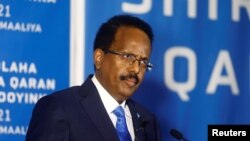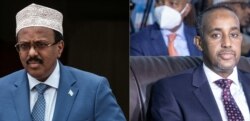Somalia's president and prime minister appear locked in a power struggle over the country's spy chief and the death of a cybersecurity agent. Prime Minister Mohamed Hussein Roble this week suspended the head of the National Intelligence and Security Agency, Fahad Fassin, for failing to investigate the agent’s death. But the president rebuked the move and on Wednesday appointed Yasin as a national security adviser.
President Mohamed Abdullahi Farmajo convened a national security meeting on Tuesday and reshuffled some top security positions, appointing suspended spy director Fahad Yassin as his national security adviser, while installing former Banadir regional intelligence chief Colonel Yassin Abdullahi as new acting director of the National Intelligence and Security Agency, NISA.
Roble described the president’s move as an obstruction of justice toward the investigation of the alleged death of young female spy Ikran Tahlil Farah.
Farah disappeared in June and was declared dead by NISA this month, though the spy agency has yet to disclose any details about her passing.
Political analyst Hassan Mudane says the bitter exchange between offices of the president and his prime minister could weaken cooperation between federal government institutions.
He says various institutions such as the judiciary, the presidency, the security departments mainly in the capital of Mogadishu as well as the fight against the armed group al-Shabab, will be affected by the wrangles. He added that the election process coordinated by the office of the prime minister will also be tested.
Elections for 19 remaining seats in the upper house of Parliament and 275 members of the lower house are expected to kick off shortly in Somalia’s slow-moving election process.
But according to security analyst Samira Ahmed of the Hiraal Institute, the tiff between two top leaders will make the work of Somali security agencies and their international partners very hard.
She said the prime minister was tasked to spearhead the electoral process, which was in good shape so far, but this latest difference between his office and that of the president may impact on security and damage the credibility and confidence in the electoral process. She added that in terms of perception, it also damages the legitimacy of the state building process in the eyes of the Somali people and international partners, as well.
In a joint press statement, the leaders of the opposition who are also presidential candidates threw their weight behind the prime minister while terming the actions of the president as derailing the ongoing election process.





